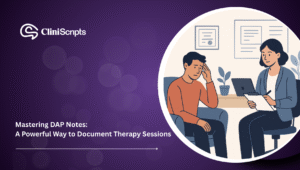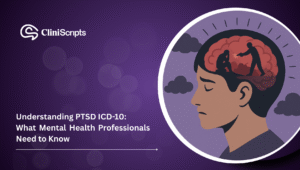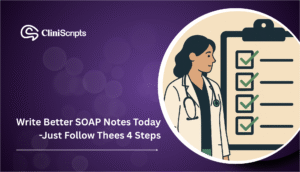Reviewed By: Dr Alex Evans
Therapeutic Notes A Complete Guide
In the world of healthcare, good documentation is super. It doesn’t matter if you’re a therapist, psychologist, or counselor; clear and organized notes are key to giving quality care. Therapeutic notes also known as therapist notes or therapy notes, are really important in tracking how patients are doing, planning their treatment, and keeping everyone on the same page in healthcare. In this blog post, we’ll dive into what you need to know about therapeutic notes. Plus, we’ll talk about how cool tools like CliniScripts can help with your note-taking.
What Are Therapeutic Notes?
Therapeutic notes, often called therapist notes or therapy notes, are detailed records made by mental health professionals during or right after a therapy session. They show how the client is progressing, what the therapist observes, & the methods used in therapy. Unlike regular medical notes that cover everything, therapeutic notes zoom in on mental and emotional health. That’s why they’re super important in mental healthcare.
Why Are Therapeutic Notes Important
These notes aren’t just about what went down in a session! They are essential for:
- Tracking Progress: Keeping updated therapeutic notes helps therapists see how clients are doing over time. They can spot patterns & make smart treatment choices.
- Planning Treatment: By writing down the techniques used & how clients respond, therapists can tweak their treatment plans to fit clients’ needs better.
- Legal and Ethical Documentation: Having accurate and detailed therapeutic notes is crucial for staying safe legally & ethically. Plus, they help with insurance billing.
- Communication: Therapeutic notes help healthcare providers talk clearly with each other. This way, everyone knows what’s going on when several professionals are involved with a client.
How to Write a Therapy Note
Writing good therapy notes is like an art! You need to be thorough while still keeping it brief. Here’s a simple guide on how to do it:
- Start with the Basics: Note the date, time, length of the session, and client’s name (and any identifiers).
- Use a Structured Format: Think about using formats like SOAP (Subjective, Objective, Assessment, Plan) or DAP (Data, Assessment, Plan). They bring orders & help you review them easily later.
- Be Objective and Clear: Write down facts & what clients say without adding your opinions. For example: instead of “The client seemed upset,” say “The client reported feeling upset.”
- Document the Therapeutic Process: Talk about what techniques were used, how clients responded & any interventions made during the session—this shows how effective therapy is!
- Highlight Key Points: Focus on important events or shifts in behavior, mood, or progress so that key info sticks out easily.
- Keep it Confidential: Make sure your notes are stored safely and meet all legal/confidentiality standards.
How to Write Therapy Notes: Best Practices
- Use Professional Language: Always stick to clear & professional language in your notes; avoid slang.
- Be Concise but Thorough: It’s great to be detailed but leave out unnecessary stuff that doesn’t help understand the client’s progress or treatment plans.
- Review and Revise: After writing your notes, look them over for clarity and accuracy! Fix any mistakes before you’re done.
The Role of AI in Writing Therapeutic Notes
With AI being part of healthcare now, tools like CliniScripts are changing the way we create therapeutic notes! CliniScripts—developed by Markitech—offers an advanced AI note-taking tool designed just for healthcare. Here’s how AI can step up your note-taking game:
- Automation and Efficiency: AI tools like CliniScripts can automatically generate therapeutic notes based on info from sessions! It saves time & makes manual documentation easier!
- Accuracy and Consistency: AI helps keep your notes consistent and accurate. Fewer errors? Yes, please!
- Customizable Templates: With CliniScripts, therapists can tailor templates if needed so everything important gets captured.
- Data Security: AI tools focus on keeping patient data safe! They ensure therapeutic notes stay secure and follow all legal standards.
Psychologist Notes:
A Specialized Form of Therapeutic Notes
Psychologist notes are a special kind of therapeutic note used by psychologists to record sessions with clients. These often include much more detail about psychological assessments along with diagnostic info & treatment plans. Writing these psychologist notes follows similar principles as regular therapeutic notes but focuses more on evaluations and interpretations.
Conclusion
Therapeutic notes are super important in mental health care! They provide a reliable way to document client progress, plan treatments effectively, and promote clear communication among healthcare providers. By following some best practices & using AI tools like CliniScripts therapists can improve their documentation’s quality while saving time—so they can spend more energy where it counts—giving amazing care to their clients!
Want to explore more ways AI is transforming healthcare and elder care? Dive into our other insightful articles and stay ahead in the world of innovation!









